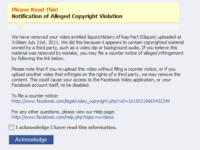The Federal Court of Canada has strongly rejected an attempt by Voltage Pictures, one of Canada’s most litigious copyright companies, to use a reverse class action lawsuit approach to sue potentially thousands of Canadians. The court ruled that Voltage met none of the requirements for class action certification and in the process confirmed doubts that merely pointing to an IP address is sufficient grounds for a copyright infringement claim. The Voltage strategy was launched in 2016 as it sought certification of the class, a declaration that each member of the class had infringed its copyright, an injunction stopping further infringement, damages, and costs of the legal proceedings (the issues were discussed in this Lawbytes podcast episode with James Plotkin).
Post Tagged with: "voltage"
Supreme Court of Canada on Copyright Notices: Identification of IP Address “Not Conclusive of Guilt”
The initial emphasis on last week’s Supreme Court of Canada’s copyright notice decision has focused on how Internet providers can pass along the specific costs associated with subscriber disclosures beyond those required for the notice-and-notice system to rights holders. The ruling rightly restores the notice system back to its intended approach, but it is not the only takeaway with implications for the recent flurry of file sharing lawsuits. While there has been a huge number of claims filed in Canada (with some surprisingly large settlements), the Supreme Court acknowledged important limitations in notice claims, noting that merely being associated with an IP address is not conclusive of guilt.
Notice the Difference?: Supreme Court Rules ISPs Can Be Compensated for Copyright Costs
Policy makers have long struggled to strike a fair balance in crafting rules to address allegations of copyright infringement on the Internet. Copyright owners want to stop infringement and the right to pursue damages, Internet subscribers want their privacy and freedom of expression rights preserved in the face of unproven allegations, and Internet providers want to maintain their neutrality by resolving the disputes expeditiously and inexpensively.
My Globe and Mail op-ed notes that the Canadian system for online infringement was formally established in 2012 and came into effect in 2015. The so-called “notice-and-notice” approach grants rights holders the ability to send notifications of alleged infringement to Internet providers, who are required by law to forward the notices to the relevant subscriber and to preserve the data in the event of future legal action. The system does not prevent rights holders from pursuing additional legal remedies, but Internet providers cannot reveal the identity of their subscribers without a court order.
Canadian File Sharing Lawsuit Could Upend Copyright Privacy Protections
The centerpiece of Canada’s 2012 digital copyright reforms was the legal implementation of the “notice-and-notice” system that seeks to balance the interests of copyright holders, the privacy rights of Internet users, and the legal obligations of Internet service providers (ISPs). The law makes it easy for copyright owners to send infringement notices to ISPs, who are legally required to forward the notifications to their subscribers. The personal information of subscribers is not disclosed to the copyright owner.
Despite the promise of the notice-and-notice system, it has been misused virtually from the moment it took effect with copyright owners exploiting a loophole in the law by sending settlement demands within the notices.
My weekly technology law column (Toronto Star version, homepage version) notes that the government has tried to warn recipients that they need not settle – the Office of Consumer Affairs advises that there are no obligations on a subscriber that receives a notice and that getting a notice does not necessarily mean you will be sued – yet many subscribers panic when they receive notifications and promptly pay hundreds or thousands of dollars.
Voltage Pictures Launches Canadian File Sharing Lawsuit With Reverse Class Action Strategy
Voltage Pictures, which previously engaged in a lengthy court battle to require Canadian ISPs to disclose the names of alleged file sharers, has adopted a new legal strategy. This week, the company filed an unusual application in federal court, seeking certification of a reverse class action against an unknown number of alleged uploaders of five movies using BitTorrent (The Cobbler, Pay the Ghost, Good Kill, Fathers and Daughters, and American Heist). The use of reverse class actions is very rare in Canada (only a few have been reported). There were attempts to use the mechanism in copyright claims in the U.S. several years ago without success.
The Voltage filing seeks certification of the class, a declaration that each member of the class has infringed its copyright, an injunction stopping further infringement, damages, and costs of the legal proceedings. Voltage names as its representative respondent John Doe (linked to a Rogers IP address). It admits that it does not know the names or identifies of any members of its proposed class, but seeks to group anyone in Canada who infringed the copyright on one of the five movies. Voltage does not say how many people it has identified as infringing its copyright. It urges the court to issue an order to stop the infringement and to assess damages to be paid by each person.











